
SAAIDS2023: Disrupting patriarchy is at the centre of ending HIV

This week, thousands of leaders from government, civil society, research and medical sectors gathered in Durban for the 11th South African AIDS Conference. Under the theme “Act, Connect and End the Epidemic”, the gathering was yet another sobering moment to take stock of our collective efforts and progress in ending HIV especially in the context of the Covid-19 pandemic that drastically impacted on our HIV response.
While we have made incredible progress in many areas, such as recovering from the challenges brought by the pandemic, it was the rising cases of HIV infections among young people, teenage pregnancy and the prevalent rape culture that took centre stage yet again. The news that over 1,300 young individuals between the ages of 15 and 24 have tested positive for HIV engulfed headlines and dominated all discussions around the conference. This distressing statistic coincides with figures from the KwaZulu Natal MEC that more than 26,000 girls aged 10 to 19 fell pregnant between April and December 2023.
Horrific as these statistics are, they are unfortunately not new. We must continue to be shocked and appalled at the figures, but we must also reflect on how as a country we continue to fail children and the youth – especially girls and young women.
We assert that South Africa needs to take a proactive approach in addressing the social determinants that contribute to these problems, such as examining family dynamics and promoting comprehensive sexuality education. Additionally, we highlight the importance of the criminal justice system's response to these issues, emphasising the need to hold perpetrators accountable.
Children and young people should not be expected to bear the burden of such circumstances, and we, as a society, have failed because these problems persist.
In a dialogue hosted by the Soul City Institute at the conference, girls and young women specifically highlighted the need for parents and guardians to show up for them and be the people they need to thrive and live substantive lives.
“It starts at home. We need our parents to come through for us and support us as we become young adults. We need them to be honest about what it means to be young, what happens to our bodies and to know our rights,” a 13-year-old Rise Club Member said at the conference.
“Instead of always warning and scaring us about pregnancy, why don’t they sit us down and tell us there will be a time when we start being attracted to other children and how we can handle it? Our parents need to learn how to talk to us.”
Nonhlanhla Magwaza echoes her words: “Parents, it's time to break the barriers and not let religion and culture stop you from talking about sex and HIV! Let's talk about sex, teen pregnancy, STIs and HIV with our kids. Education is power. Let's keep them informed and safe.” Magwaza is a former Social Mobiliser and fellow in our flagship Feminist Leadership and Activism Centre (FLAC) based in Ndwendwe.
We need to look at how families interact with their children and communicate in the home around sexual and reproductive health and rights. We must embrace the comprehensive sexuality education (CSE) that is offered in school because it gives age-appropriate information.
Soul City Institute CEO Phinah Kodisang added: “We must not forget our response in terms of the justice system. How are we responding to statutory rape? How are we addressing the perpetrators of violence against our children? Because at the end of the day, these are children - a 10-year-old is a child. A child cannot be expected to be a parent. We have failed if we see these things still happening. It's a collective failure. It's a systemic failure.”
There are multiple factors that contribute to these issues, such as the lack of comprehensive prevention strategies and the normalisation of rape culture. We stress the need to address the social determinants of health comprehensively and break down the silos that exist in interventions. Furthermore, the legal obligations of hospitals and healthcare professionals to identify the responsible individuals and report cases of underage pregnancy and HIV infections.
We acknowledge the complex dynamics involved in these issues, including communication barriers, societal attitudes and the roles of various stakeholders. We underscore the necessity of changing men's behaviour, addressing the silence and complicity of communities, implementing policies effectively, and transforming social norms to bring about meaningful change. While challenges persist, we believe that change is possible through collective effort and a comprehensive approach to addressing these pressing issues.
It’s not just the responsibility of those who gathered in Durban this week, but each and every one of us must show up for children and be adults who protect and promote their rights. Collectively, in our diverse communities, must ensure that we create an enabling environment – free from patriarchy and all prejudice – to realise the full potential of the children and youth of South Africa.
For media queries, contact:
Soul City Institute Communications Team
disruptingpatriarchy@soulcity.org.za
011 771 7973
